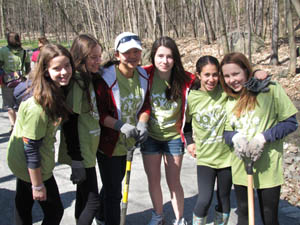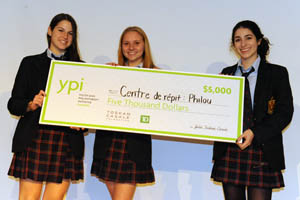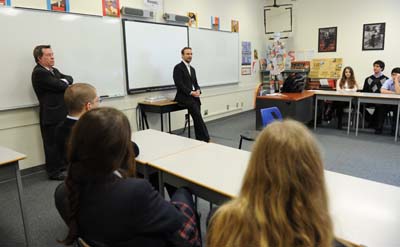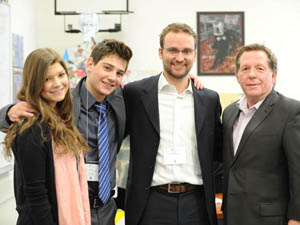 Afin de souligner l’année internationale des forêts, les élèves du Middle School ont décidé de participer à la 20e édition de la corvée du Mont-Royal. À 8h30, tout le monde était au rendez-vous et, pendant toute la matinée, les élèves ont planté, planté, planté…
Afin de souligner l’année internationale des forêts, les élèves du Middle School ont décidé de participer à la 20e édition de la corvée du Mont-Royal. À 8h30, tout le monde était au rendez-vous et, pendant toute la matinée, les élèves ont planté, planté, planté…
Photos
Planter des arbres au Mont-Royal était très amusant, on a travaillé pour le service communautaire et on a passé une bonne journée. Je voudrais faire ce type d’activité encore une fois. Cela a ouvert mes yeux sur le monde et sur les changements que je peux faire pour aider l’environnement.
—Arielle Shiri ’14
Mon expérience au Mont-Royal a été une tonne de plaisir. Quand nous sommes arrivés, un groupe de personnes a parlé de l’importance de planter des arbres. Ensuite, en groupes, nous avons eu du matériel et des t-shirts. Nous avons ensuite creusé des trous et planté de jeunes arbres qui deviendront grands. J’ai eu beaucoup de plaisir et j’aimerais le refaire.
—Samantha Adessky ’14
Planter des arbres au Mont-Royal était une expérience que je n’oublierai jamais. Maintenant chaque fois que j’irai là-bas, je pourrais dire à mes amis « Voyez-vous cet arbre ici? C’est moi qui l’ai planté ». Rien que ça est assez pour dire que c’était une bonne expérience.
—Matthew Kaspy ’14
Planter des arbres pour la fondation “les amis de la montagne” était une expérience que je ne vais pas oublier. Une pelle dans une main et un sceau dans l’autre, nous avons planté toute la matinée.
—Montana Black ’14
L’expérience au Mont-Royal était très amusante! Premièrement, j’ai fait beaucoup d’exercices en montant et en descendant la montagne! Je n’avais jamais planté d’arbres de ma vie. Je suis très heureuse d’avoir pu faire une différence dans la communauté et de la rendre plus belle! J’espère qu’il y aura beaucoup d’autres activités comme ça à l’avenir.
—Kaitlin Markus ’14
C’était un matin chaud, le soleil brillait, une journée parfaite pour planter des arbres. Quand nous sommes arrivés, la guide nous a montré comment faire. Après, nous nous sommes mis au travail. À la fin, nous étions fiers de notre travail.
—David Rosenberg ’14
Pour moi, planter des arbres était une nouvelle chose et je ne pouvais pas être plus heureuse avec ma première expérience. Tout était très bien organisé et que les instructions étaient très claires. Notre guide a été très gentille et elle m’a énormément aidée. Elle m’a donné le goût de planter d’autres arbres.
—Stephanie Shannon ’14
J’ai vraiment apprécié planter des arbres. C’était la première fois et ce fut une bonne expérience. C’était une bonne journée pour cette activité. Je suis impatiente de retourner au Mont-Royal pour voir les beaux arbres que nous, en tant que groupe, avons plantés ensemble.
—Jaclyn Lavy ’14
Cette expérience m’a fait du bien. C’était ma deuxième visite à la montagne pour travailler au service communautaire et c’était aussi satisfaisant que la première fois. Je sentais que je faisais vraiment quelque chose de bien et qui faisait une différence. Cela m’a permis d’apprécier la nature et l’environnement. Planter juste un arbre était beaucoup de travail mais j’en ai planté 4 avec l’aide de ma partenaire, Julianna. Je le referai encore si j’avais la chance. —Stephany Hwang ’14
À lire:
Corvée du Mont-Royal 2011
À regarder (film et photos):
Des forêts et des hommes par Goodplanet.org



